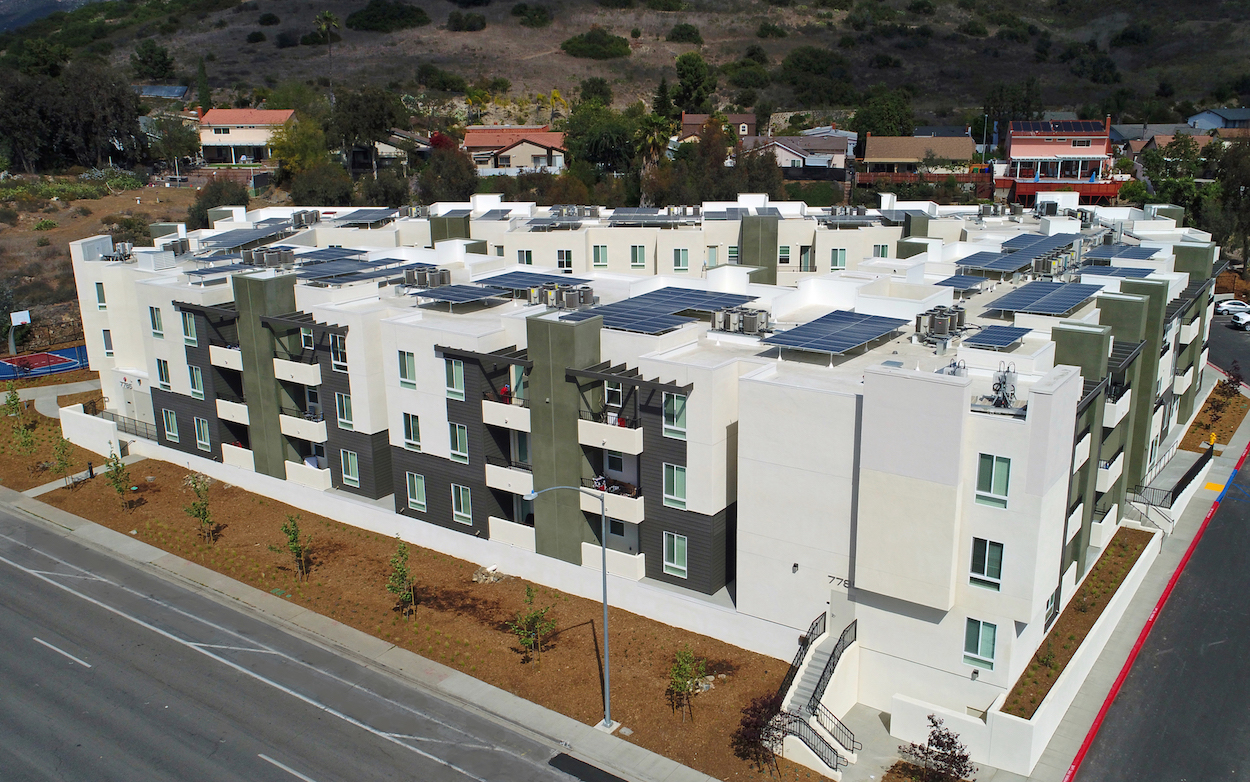Daily Business Report-June 4, 2018
Rendering of the Manchester Pacific Gateway project (Courtesy of Manchester Financial Group)
Tearing Up Downtown Waterfront
Manchester Pacific Gateway project gets underway
Work started Saturday on the largest private real estate development in San Diego — the $1.5 billion Manchester Pacific Gateway project. Developer Manchester Financial Group is optimistic the 12-acre project will open in three years.
Thedevelopment will cover eight city blocks at the waterfront and contain seven buildings, including a 17-story Class A office building that will replace the Navy Broadway Complex and serve as the Navy’s regional headquarters.
More than four acres of the project will be dedicated to public open space, including a 1.9-acre plaza on the waterfront at the foot of Broadway along Harbor Drive.
_________________

Chelsea Investment Corp. Replaces Strip
Mall with 89 New Affordable Apartments
The city of San Diego has gained 89 new affordable rental homes serving low-income families, thanks to the collaborative efforts of the San Diego Housing Commission and Chelsea Investment Corporation.
Chelsea’s new Mesa Verde apartment complex replaces an outdated strip mall located at 7785 Mission Gorge Road in the Navajo Community Planning area near Mission Trails Regional Park. Residents will benefit from close proximity to extensive open space, schools, employment opportunities and medical facilities.
Mesa Verde includes three studios, 24 one-bedroom, 36 two-bedroom, and 26 three-bedroom units. Rents range from $800 for a one-bath studio to $1,420 for a 971-square foot, three-bedroom unit. Apartments will remain affordable for 55 years for households with annual incomes of up to 60 percent of San Diego’s Area Median Income (approximately $58,380 for a family of four).
Chelsea Founder and CEO Jim Schmid noted that the revitalization of the property was overwhelmingly supported by the local planning group.
Amenities at Mesa Verde include a basketball court, community room, laundry facilities, an on-site manager, and underground parking.
Total development cost is approximately $33.5 million, which includes the land, construction, and financing expenses. The San Diego Housing Commission invested a $9.6 million loan toward the development, and authorized the issuance of nearly $22.4 million in tax-exempt Multifamily Housing Revenue Bonds, approved by the San Diego City Council, sitting as the Housing Authority of the City of San Diego.
Additional financing was provided by Citi Community Capital and Candeur Group. Project architect is The McKinley Associates, with Emmerson Construction as the general contractor.
There are currently 2,530 individuals on the waiting list for Mesa Verde.
_________________
Gubernatorial Appointment
William Y. Wood Appointed to Superior Court Bench

William Y. Wood, 58, of Carlsbad, has been appointed to a judgeship in the San Diego County Superior Court by Gov. Jerry Brown. Wood has served as a commissioner at the San Diego County Superior Court since 2009. He served as a deputy district attorney at the San Diego County District Attorney’s Office from 1990 to 1998 and from 2001 to 2008 and was cross-designated as a Special Assistant U.S. Attorney at the U.S. Attorney’s Office, Southern District of California from 2003 to 2006.
Wood served as a U.S. foreign service officer at the U.S. Department of State from 1998 to 2000. He earned a Juris Doctor degree from the University of Arizona College of Law, a Master of Science degree from Trinity University and a Bachelor of Science degree from the University of Arizona. He fills the vacancy created by the elevation of Judge Patricia Guerrero to the Court of Appeal. Wood is a Democrat.
_________________
Salk Institute Receives $1.5 Million
for Alzheimer’s Research from Nanos Co. Ltd.
The Salk Institute has received $1.5 million for research into the cellular underpinnings of Alzheimer’s disease from NANOS Co. Ltd., a company based in the Republic of Korea. The funds will establish a dedicated laboratory space called the NANOS Alzheimer’s Disease Stem Cell Suite, which will serve as a cell bank focused on Alzheimer’s. This cell bank will house both stem cells and somatic (body) cells from human donors, critical for analysis and testing of therapeutic drugs.
“We are very excited to support this research into Alzheimer’s and build an emerging partnership between Salk and NANOS,” says Seon Gil Yang, chief executive officer of NANOS. “It is vitally important for companies to support foundational research and build collaborations that can lead to essential therapies.”
_________________

Community College District Offers
Expanded Online Summer Classes
Students looking to satisfy their general education requirements, boost their job skills, or explore a new interest will have plenty of options to choose from when the first of several summer sessions begins today at San Diego City, Mesa, and Miramar colleges.
Some 3,440 classes are available in all, and City, Mesa, and Miramar colleges are offering more sections online and more sections at night to make it more convenient for students to study. Miramar College, for example, has more than tripled the number of its evening class sections, and the number of online classes is up throughout the San Diego Community College District (SDCCD).
Classes range from an Introduction to Digital Photography course at City College to a History of the U.S., Black Perspectives course at Mesa College, and a Veterinary Microbiology and Immunology class at Miramar College. Online classes abound with a wide variety of selections that include classes such as Financial Accounting, Criminal Law, United States History from a Chicano Perspective, Mass Media in the Digital Age, Real Property Management, and Introduction to Child Psychology.
Free noncredit courses are also available at San Diego Continuing Education starting at various times throughout the summer months. Noncredit courses at Continuing Education range from Sewing Fundamentals to Computer Basics and Arts and Crafts for Older Adults.
The first session begins today at City, Mesa, and Miramar colleges, and June 8 at Continuing Education.
Students interested in signing up for classes can register online at https://studentweb.sdccd.edu/reg-e/
_________________
California Moves Closer to Its Own
Sweeping Net Neutrality Rule
Will it save the open Internet?
By Antoinette Siu | CALmatters
With just 10 days to go until the federal government intends to roll back net neutrality, California’s Senate has stepped into the void by advancing a bill that aims to maintain equal internet access for all its citizens.
This fight over who pays for the Internet and how it should be regulated now shifts to the Assembly and, if it passes there, on to Gov. Jerry Brown. If he were so sign it, the state would have the strictest net neutrality rules in the nation—but could well face a court challenge from internet service providers who contend the state is overstepping its authority.
Democrats have been pushing legislation to require internet companies to play by net neutrality rules ever since the Federal Communications Commission voted to repeal net neutrality last December. The federal regulations, set to be jettisoned June 11, ensured that internet providers such as Comcast, AT&T and Verizon give equal access to the web, regardless of payment, data or type of service.
The Senate voted this week along party lines to approve Senate Bill 822 by San Francisco Democrat Sen. Scott Wiener. The proposed regulation would prevent Internet service providers from blocking or slowing down internet traffic for consumers, and also prohibit them from giving priority deals to those who pay for sponsored content.
In recent years, the FCC has found that Comcast and Verizon interfered with access by giving priority to certain users in exchange for compensation.
But internet providers say this sort of regulation will drive up their costs to comply, meaning they would need to charge customers more for internet services. Plus, they note, the proposed California rules would be even more restrictive than the federal rules they aim to replace.
“We need to act at a state level to protect residents, their businesses, our democracy,” Wiener told CALmatters. “When you have Internet service providers picking winners or losers on the internet … it impacts everything.”
Everything from the startup businesses to brick-and-mortar companies, and from grassroots activism to telemedicine rely on accessing the web, he said, and all those users could be impacted when internet providers start manipulating speed, access and prices for consumers.
Earlier this year, state Sen. Kevin De Léon, a Los Angeles Democrat, introduced a similar bill that is currently in the Assembly. De Léon’s bill aims to adopt the key parts of neutrality rules established by the federal government in 2015.
Since the FCC repeal, 28 states, including New Jersey and Vermont, have introduced legislation to protect net neutrality, according to a legislative analysis.
But Wiener says his bill is more comprehensive than some others by writing rules beyond that of the federal order established three years ago. For instance, it prohibits internet providers from engaging in zero rating, the practice of incentivizing users to use their products rather than their competitors’ in exchange for free data, for compensation from third parties.
It would put the state attorney general in charge of enforcing these rules at an annual cost of $1.8 million.
Supporters of net neutrality argue that consumers should be free to choose and access websites as they want, without interference from a handful of internet providers. They also contend that creating different tiers of service would further the digital divide between those can and cannot afford access to the web.
The bill has broad support from labor groups and companies that rely on the Internet.
Because 87 percent of rural Americans have one or no option for high-speed internet, removing net neutrality protections would hurt innovation, small businesses and consumers, said the Internet Association, an organization representing members like Amazon and Netflix.
“We use apps to find marches and to meet other activists, to learn about candidates, and to find a movement where we feel represented,” the California Labor Federation said in a statement. “All of this depends upon unfiltered access to the information we seek. That is all this bill will provide.”
The gatekeepers, on the other hand, don’t want more regulation on their businesses. Moreover, internet service providers and other opponents say a California net neutrality bill would add to their costs of operating in the state.
And because it is costlier to provide service in rural areas, the companies say this regulation would discourage broadband investment in those areas.
“Given that providers have finite budgets, and rural areas are generally the most expensive in which to deploy broadband with challenging payback economics, increased regulatory expenditures necessarily drain the capital available for rural broadband deployment,” Frontier Communications wrote in an opposition letter.
Republican lawmakers who opposed the bill insisted that it would increase the costs on internet providers, who would then simply pass those extra costs on to their California customers. Sen. Patricia Bates, a Laguna Niguel Republican, said the debate for net neutrality should take place at the federal level —not here.
“Internet providers are already held legally accountable by the California attorney general and federal government. Ultimately, all this bill will succeed in doing is opening up our state to legal challenges and costly litigation, which we know is coming if the bill is passed,” Bates said.
If the bill makes it out of the Assembly and becomes law, Internet service providers will have to obey these regulations if they want to operate in the state. But they’re unlikely to go down without a fight.
Said Sen. Bob Hertzberg, a Van Nuys Democrat who voted for the bill: “We know the second this thing passes, all the various players … are going to litigate it.”
CALmatters.org is a nonprofit, nonpartisan media venture explaining California policies and politics.



